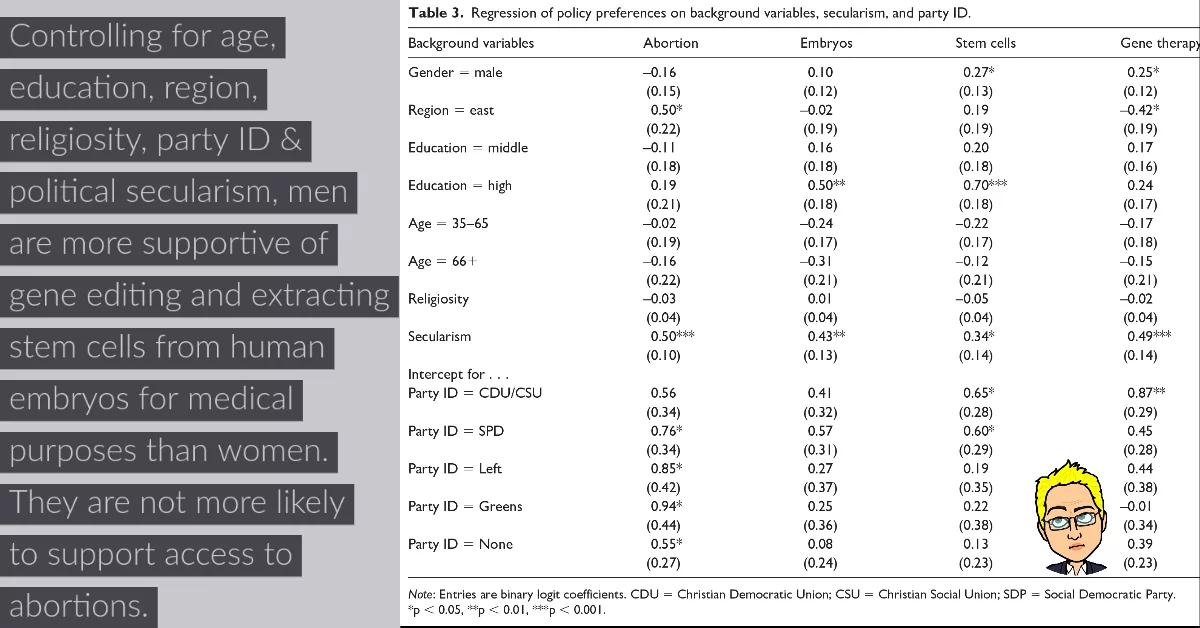Men are more positive about (some) reproductive science and technology than women
Here is a by-catch finding from my recent article on the micro-foundations of the two-worlds theory of moral policy (full article, ungated). In the article, I look at the effect of a) party identification, b) religiosity, and c) political secularism (a desire for the separation of religion from politics) on the preferred regulation of various moralized policies in Germany. I control for age, education, region (east vs west), and gender.
In the article, I don’t talk much about the gender effects, because a) there was a strict word limit and b) they are somewhat tangential to the article’s main argument. But I find them intriguing. Here is the main table from the article. Entries are logit coefficients (I know). What do all those numbers mean?
Controlling for everything else (including the slightly gendered differences in religiosity and secularism), male respondents are just a tad less likely than females to support women’s access to legal abortions, although the difference is nowhere near statistically significant. Conversely, men are slightly more supportive of research on human embryos for medical purposes, but again, the difference is not significant.

However, once we turn to high-tech interventions – extracting stem cells from early embryos and gene editing – men are significantly more supportive than women. The effect is small compared to everything else that is going on in the model, but it is there even after controlling for religion, secularism, education et al.. If that does not make you think about gendered view on reproductive rights and control over female bodies, I don’t know what will.
Do you find this kind of research interesting?There is more where that came from.
Bonus track: show us the items
The article in all its glory is open access, so simply click to have a look at the whole thing. I think it’s fascinating stuff, but then again, I’m a nerd. The operationalisations are buried in an appendix, so I’m reproducing them here for easy reference.
| Abortion | If a woman wants to have an abortion, this should be legal, no matter what her reasons are: no (0); yes (1) |
| Embryos | Research on human embryos should be banned, even if this means that patients will not benefit from new treatments: disagree strongly, disagree somewhat (1); neither/nor, agree somewhat, fully agree (0) |
| Stem cells | In stem cell research, scientists extract cells from a human embryo less than two weeks after fertilization. These cells are not implanted in a woman’s uterus but grown in the lab to treat patients with genetic disorders. Do you fully approve of this, requiring no specific regulation, approve if this is strictly regulated (1); approve only if there are exceptional circumstances, approve under no circumstances (0) |
| Gene therapy | Scientists are working on gene therapies: treatments that work by modifying the human genome. Do you fully approve of this, requiring no specific regulation, approve if this is strictly regulated (1); approve only if there are exceptional circumstances, approve under no circumstances (0) |

Hm, der ISSP war es nicht. Muss mal gründlicher schauen
Kleinere Unterschiede schon. Wenn ich mich richtig erinnere, hatte der ISSP ein Modul, mit dem man früher ein bisschen was gesehen hat. Ob das heute bzw. für Jüngere noch gilt, müsste man sich mal anschauen.
Sure. Something specific that is worrying you?
Gibt es eigentlich einen Unterschied bei generellen Technik-Support zwischen Männern und Frauen? Asking for a friend.
I personally agree with your point about the need for a “gendered view on reproductive rights”.
My point more generally is that in public discourse – esp. from interested sides – the details are neglected and simplistic statements are passed on. This contributes to polarisation.
‘However, once we turn to high-tech interventions – extracting stem cells from early embryos and gene editing – men are significantly more supportive than women.’ #buriedlede
#harsh #buttrue 😉
Wissenschaft sollte nicht zu Generalisierungen beitragen. Hier gibt es einen (interessanten, aber sehr geringen, zudem statistisch nicht signifikanten) Effekt. Er kann Aussagen über „German men“ im allgemeinen in keiner Weise rechtfertigen. Bitte mehr Differenzierung!
#lasttweet
Wie entstehen Gerüchte? Wenn ein Wissenschaftler aus diesem Fakt („male respondents are *just a tad* less likely than females to support women’s access to legal abortions, although the difference is nowhere near statistically significant“) eine generalisierenden Tweet macht
#fail